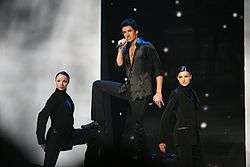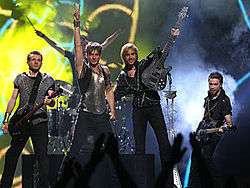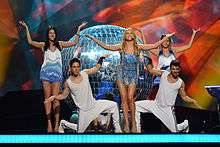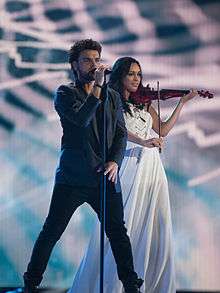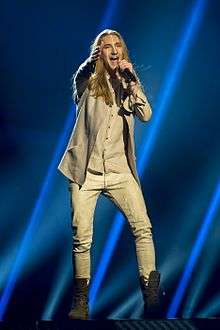Belarus in the Eurovision Song Contest
| Belarus | |
|---|---|
 | |
| Member station | BTRC |
| National selection events |
National Final
Internal Selection
|
| Participation summary | |
| Appearances | 15 (5 finals) |
| First appearance | 2004 |
| Best result | 6th: 2007 |
| Worst result | 22nd SF: 2006 |
| External links | |
| BTRC page | |
| Belarus's page at Eurovision.tv | |
|
Belarus in the Eurovision Song Contest 2018 | |
Belarus has participated in the Eurovision Song Contest 15 times since making its debut in 2004. Dmitry Koldun became the country's first entrant to reach the final at the 2007 contest, where he finished sixth with the song "Work Your Magic". This remains Belarus' only top ten placement. Belarus also qualified for the final in 2010, 2013, 2014 and 2017.
History
Belarus entered the contest in the same year that semi-finals began to be used to determine who would compete in the final. Belarus has so far managed to qualify for the final five times: in 2007 with Dmitry Koldun, in 2010 with band 3+2, in 2013 with Alyona Lanskaya, in 2014 with Teo and in 2017 with Naviband.
After the 2009 edition, Belarusian president Alexander Lukashenko, said that it was necessary to completely replace the current working team behind Belarus' Eurovision entry. Lukashenko pointed out his frustrations over divisions within the team.
Alexander Rybak, the winner of the 2009 contest representing Norway, expressed an interest in composing an entry for his birth country Belarus.[1] An attempt to compose a song for Belarus materialized in 2015, when Rybak composed a song called "Accent", sung by a group of young women created by himself and called Milki.[2] Despite being the favourite to win the national final that year, it only got a 4th place.
Contestants
- Table key
| Year | Artist | Language | Title | Final | Points | Semi | Points |
|---|---|---|---|---|---|---|---|
| 2004 | Aleksandra and Konstantin | English | "My Galileo" | Failed to qualify | 19 | 10 | |
| 2005 | Angelica Agurbash | English | "Love Me Tonight" | 13 | 67 | ||
| 2006 | Polina Smolova | English | "Mum" | 22 | 10 | ||
| 2007 | Dmitry Koldun | English | "Work Your Magic" | 6 | 145 | 4 | 176 |
| 2008 | Ruslan Alekhno | English | "Hasta La Vista" | Failed to qualify | 17 | 27 | |
| 2009 | Petr Elfimov | English | "Eyes That Never Lie" | 13 | 25 | ||
| 2010 | 3+2 feat Robert Wells | English | "Butterflies" | 24 | 18 | 9 | 59 |
| 2011 | Anastasia Vinnikova | English | "I Love Belarus" | Failed to qualify | 14 | 45 | |
| 2012 | Litesound | English | "We Are the Heroes" | 16 | 35 | ||
| 2013 | Alyona Lanskaya | English | "Solayoh" | 16 | 48 | 7 | 64 |
| 2014 | Teo | English | "Cheesecake" | 16 | 43 | 5 | 87 |
| 2015 | Uzari & Maimuna | English | "Time" | Failed to qualify | 12 | 39 | |
| 2016 | Ivan | English | "Help You Fly" | 12 | 84 | ||
| 2017 | Naviband | Belarusian | "Story Of My Life" | 17 | 83 | 9 | 110 |
| 2018 | Alekseev | English | "Forever" | Failed to qualify | 16 | 65 | |
| 2019 | |||||||
Voting history
As of 2018, Belarus' voting history is as follows:
|
|
| |||||||||||||||||||||||||||||||||||||||||||||||||||||||||||||||||||||||||||||||||
Commentators and Spokespersons
| Year(s) | Television Commentators | Dual Television Commentators | Spokesperson |
|---|---|---|---|
| 2004 | Ales Kruglyakov[3][4] | No dual commentator | Denis Kurian |
| 2005 | Elena Ponomareva | ||
| 2006 | Denis Kurian[5][6] | Corrianna | |
| 2007 | Alexander Tikhanovich | Juliana | |
| 2008 | No dual commentator | Olga Barabanschikova | |
| 2009 | Ekaterina Litvinova | ||
| 2010 | Aleksei Grishin | ||
| 2011 | Leila Ismailava | ||
| 2012 | Dmitry Koldun | ||
| 2013 | Evgeny Perlin | Darya Domracheva | |
| 2014 | Alyona Lanskaya | ||
| 2015 | Teo | ||
| 2016 | Uzari | ||
| 2017 | Alyona Lanskaya | ||
| 2018 | Naviband |
Photo gallery
See also
References
- ↑ "Alexander Rybak is considering a Eurovision comeback". ESCToday. 26 November 2010. Retrieved 26 November 2010.
- ↑ "Belarus: Rybak's song is revealed". ESCToday. 4 December 2014. Retrieved 4 December 2014.
- ↑ Ведущий БТ Алесь КРУГЛЯКОВ: "Я буду смеяться, если кто-то заявит, что он в одиночку изменит наше телевидение" (in Russian). Komsomolskaya Pravda. 11 June 2004. Retrieved 24 May 2013.
- ↑ Zahorodnyi, Oleksandr (20 May 2005). "10 обранців приєднаються до 14 уже відібраних учасників конкурсу Євробачення, фінальне змагання відбудеться завтра" (in Ukrainian). 1+1. Archived from the original on May 27, 2005. Retrieved 24 May 2013.
- ↑ Алеся Круглякова отстранили от эфира (in Russian). Komsomolskaya Pravda. 10 February 2006. Retrieved 24 May 2013.
- ↑ For 5 years, Denis has been the Belarusian commentator for the programme
